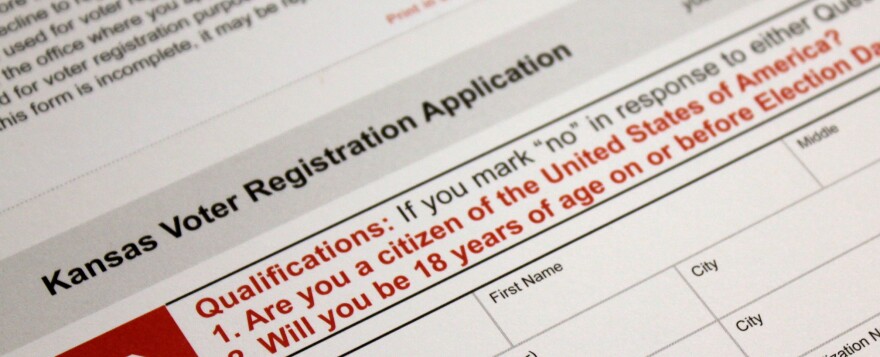It’s time to start voting, Kansas.
From the top of the primary ballot to the bottom there are important decisions to make by Aug. 2.
At the very top: U.S. Sen. Jerry Moran, 3rd District Rep. Kevin Yoder, and 1st District Rep. Tim Huelskamp are all facing primary opponents. Campaigning in the 1st District has been particularly contentious – of the mud-slinging variety – and with no Democrat in the ring, the primary will be terminal.
At the very bottom: You get to pick from or write-in candidates for precinct committeeman and committeewoman – there are a lot of vacancies in these offices that make up the party grassroots.
The primaries that could matter most are the contests in 18 state Senate districts and 47 state House districts. In many districts, the climate is not friendly for candidates tied to Gov. Sam Brownback.
Fifteen state House races will be decided on Aug. 2, with the victor facing no opposition in the general election. That, plus all the open seats and challenges to incumbents, means the makeup of the legislature could be quite different as soon as the primaries are over.
1. Not registered? You have to hurry up.
If you still need to register to vote in Kansas or update your registration you’re almost out of time. The deadline for the Aug. 2 primaries is Tuesday, July 12.
You can mail in an application (so long as it’s postmarked by July 12) or register online, but with such a short timeframe, some officials are recommending you go to your county election office to register in person.
2.Have your proof of citizenship handy.
If you’re just updating your registration online – changing your name or your address – all you need is your driver’s license or nondriver ID card number. You can just use your social security number, if you have one, to apply for an update with the paper form.
But, if this is your first rodeo as a voter in Kansas, you’ll need to show proof of citizenship with your birth certificate, passport or another document.
Here’s a full list of the documents that will work: www.gotvoterid.com/proof-of-citizenship.html
3. Registration suspended? You can fix it.
Thousands of registrations were put in limbo when the proof-of-citizenship rules came into play in Kansas.
If you are one of those thousands, because, for example, you registered at the DMV when you got your driver’s license, you still have time to fix it.
First, check with your county election office to find out the status of your registration.
You then have up until the day before the Aug. 2 election to turn in missing documents to your county election office. You can submit documents in person, by mail, or electronically – ask if your election office will accept documents by text or email.
Even if you registered at the DMV and haven't provided a citizenship document, you can vote, but only in federal races (the only federal races on the ballot Aug. 2 are the elections for U.S. Senate and U.S. House). UPDATE: A rule approved by a state panel on July 12 means you'll have to use a provisional ballot to cast even those votes in federal races. Any votes you cast on the ballot for state or local races won't be counted.
4. It’s too late to switch parties.
It may be tempting, especially if one party or another dominates your district, to switch parties so you can have a say about who is the ultimate winner. In places like Hutchinson, some candidates have even deliberately courted party-switchers.
But, sorry, Kansas law says you can’t switch after June 1.
However, if you’re unaffiliated, you can still choose a political party all the way up to, and including, Election Day. And the Secretary of State’s Office says if you’re registering for the first time in Kansas you are allowed to choose a party when you submit your application.
5. Go ahead and vote early.
If you’ve already got your registration figured out, you can request an advance ballot for the primaries through your county election office up until July 29 – they’re due back by 7 p.m. on Aug. 2 when polls close.
Counties have flexibility on in-person early voting, so dates vary by location, but it begins as soon as July 13. Contact your county election office to find out when you can vote in-person.
6. Bring your photo ID.
Remember, in Kansas, you can’t cast your vote in person or request a mail-in ballot without it.
Stephen Koranda is the Statehouse Bureau Chief for Kansas Public Radio, on Twitter @kprkoranda. Amy Jeffries is the Kansas Elections Editor at KCUR, on Twitter @amyoverhere. Kansas Public Radio and KCUR are partners in a statewide collaboration covering elections in Kansas.







